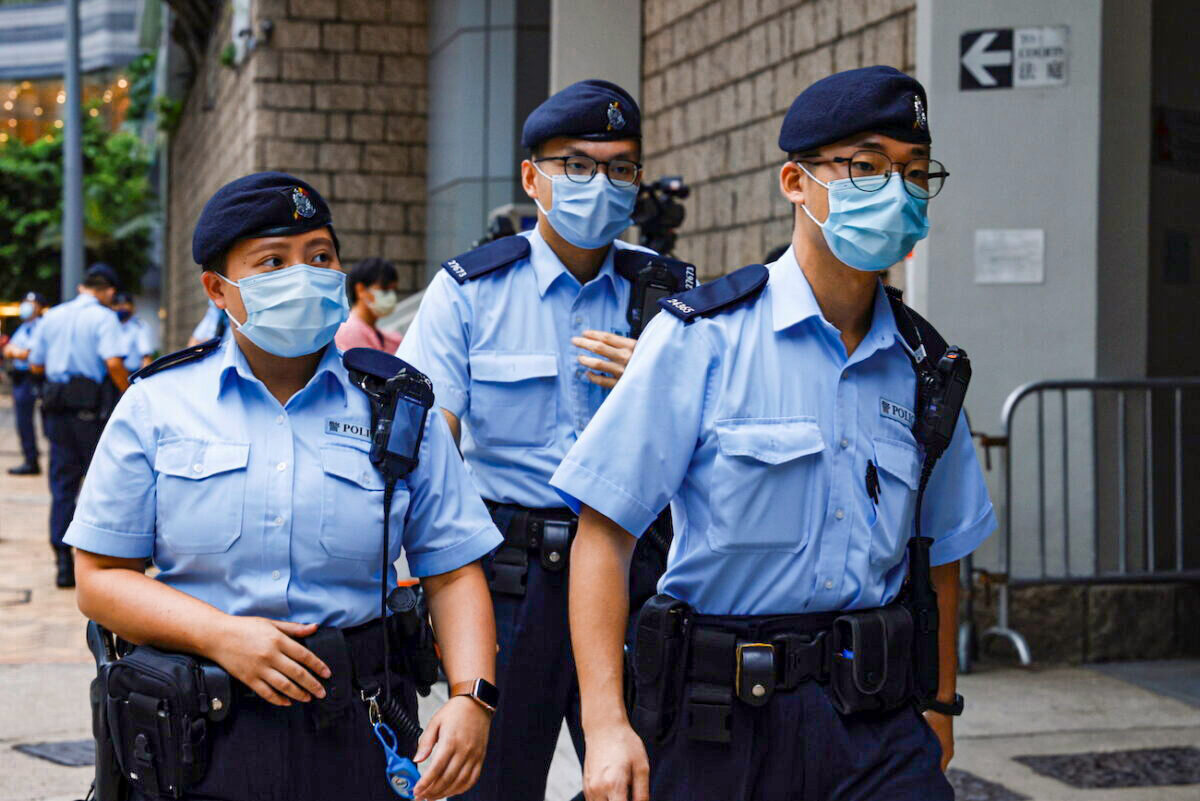Communist China’s Legal Warfare Targets Overseas Dissidents
CommentaryThe Chinese Communist Party (CCP) seeks to extend its security law to the rest of the world to target overseas Chinese dissidents (and everyone else). The Chinese communists have been evolving and honing their Three Warfares doctrine since it was endorsed by the Chinese Communist Party’s Central Committee and the Central Military Commission in 2003. Focused on helping the People’s Liberation Army (PLA) win wars by other non-kinetic means, the Three Warfares involve the softening up of adversaries via public opinion warfare, legal warfare, and psychological warfare. Much Western attention has been focused on the PLA’s employment of the Three Warfares in conjunction with CCP leadership, the ministry of foreign affairs, and state-run Chinese media as the CCP targets its main adversary, the United States, with particular emphasis on the propaganda and psychological elements of the strategy. It is well-known that the CCP seeks to shape public opinion through synchronized messaging and the use of influence agents in Western media to echo Beijing’s narrative. These efforts have been modernized through social media campaigns, including fake accounts and “bot farms.” Because the exploitation of the Three Warfares is so ingrained in the CCP through indoctrination and common use, the strategy is employed to advance other communist goals and objectives besides the ongoing hybrid warfare against the United States and its allies. For example, the legal warfare element of that strategy (adapted and renamed as “lawfare” by American leftists) is also being relentlessly used by the CCP in order to achieve another of its long-term objectives: the subjugation of overseas Chinese, followed by the subjugation of the rest of the world to “world leadership with Chinese characteristics.” Let us examine the topic. Two Key Pillars of CCP Legal Warfare The CCP believes that all people of Chinese descent are subject to the laws, dictates, and arbitrary whims of the Party regardless of their citizenship and residence. Having more or less pacified domestic Chinese over the past few decades, Xi Jinping and the CCP leadership are ramping up efforts to control overseas Chinese. Two key pillars of Beijing’s legal warfare push for control of all Chinese under the sun (and eventually, the rest of us) are the Civil Code and the National Security Law. The Civil Code was adopted at the Third Session of the 13th National People’s Congress on May 28, 2020. It micromanages Chinese society—economic, social, travel, education, etc.—and mandates compliance by all Chinese citizens irrespective of residence. Article 1 boldly states that the Code is for “developing socialism with Chinese characteristics and carrying forward the core socialist values.” And “carrying forward” is a clear signal of CCP intentions: to extend socialism with Chinese characteristics everywhere. Pupils read the Civil Code in Yantai City, East China’s Shandong Province, on Nov. 30, 2020. (Costfoto/Future Publishing via Getty Images) Just one month later (not a coincidence!), the Standing Committee of the National People’s Congress (China’s rubber-stamp legislature) passed the National Security Law on June 2020, which includes 66 articles and covers four areas of criminal activity: secession, subversion, terrorism, and collusion with foreign or external forces. Although focused on the rapid integration of Hong Kong into mainland China, most observers believe its application in Hong Kong is a trial run for its extensions overseas because the law as written applies to anyone, anywhere in the world, and is expansively extraterritorial in its scope. According to Article 38, it can apply even to offenses committed “outside the region by a person who is not a permanent resident of the region.” Testing the Pincers What do these two legalistic pincers mean for people outside China? Potentially a lot if the rest of the world allows the CCP to enforce them without pushback. In 2014, Xi directed the Ministry of State Security to conduct Operation Fox Hunt, which is an effort to target, intimidate, and abduct Chinese political dissidents and their families living overseas under the auspices of Xi’s “anti-corruption campaign.” FBI Director Christopher Wray has previously described the purpose of Fox Hunt: “Fox Hunt is a sweeping bid by General Secretary Xi to target Chinese nationals whom he sees as threats and who live outside China, across the world. We’re talking about political rivals, dissidents, and critics seeking to expose China’s extensive human rights violations.” Fox Hunt has subsequently been incorporated into Operation Skynet (shades of “The Terminator” movies!), which has a global mission focused on “recovering funds and arresting international fugitives” from CCP justice, according to ABC News. The National Security Law and Civil Code have now provided the legalistic backdrop and excuse for the CCP’s pursuit, capture, and prosecution of people under O

Commentary
The Chinese Communist Party (CCP) seeks to extend its security law to the rest of the world to target overseas Chinese dissidents (and everyone else).
The Chinese communists have been evolving and honing their Three Warfares doctrine since it was endorsed by the Chinese Communist Party’s Central Committee and the Central Military Commission in 2003. Focused on helping the People’s Liberation Army (PLA) win wars by other non-kinetic means, the Three Warfares involve the softening up of adversaries via public opinion warfare, legal warfare, and psychological warfare.
Much Western attention has been focused on the PLA’s employment of the Three Warfares in conjunction with CCP leadership, the ministry of foreign affairs, and state-run Chinese media as the CCP targets its main adversary, the United States, with particular emphasis on the propaganda and psychological elements of the strategy.
It is well-known that the CCP seeks to shape public opinion through synchronized messaging and the use of influence agents in Western media to echo Beijing’s narrative. These efforts have been modernized through social media campaigns, including fake accounts and “bot farms.”
Because the exploitation of the Three Warfares is so ingrained in the CCP through indoctrination and common use, the strategy is employed to advance other communist goals and objectives besides the ongoing hybrid warfare against the United States and its allies.
For example, the legal warfare element of that strategy (adapted and renamed as “lawfare” by American leftists) is also being relentlessly used by the CCP in order to achieve another of its long-term objectives: the subjugation of overseas Chinese, followed by the subjugation of the rest of the world to “world leadership with Chinese characteristics.”
Let us examine the topic.
Two Key Pillars of CCP Legal Warfare
The CCP believes that all people of Chinese descent are subject to the laws, dictates, and arbitrary whims of the Party regardless of their citizenship and residence. Having more or less pacified domestic Chinese over the past few decades, Xi Jinping and the CCP leadership are ramping up efforts to control overseas Chinese.
Two key pillars of Beijing’s legal warfare push for control of all Chinese under the sun (and eventually, the rest of us) are the Civil Code and the National Security Law.
The Civil Code was adopted at the Third Session of the 13th National People’s Congress on May 28, 2020. It micromanages Chinese society—economic, social, travel, education, etc.—and mandates compliance by all Chinese citizens irrespective of residence. Article 1 boldly states that the Code is for “developing socialism with Chinese characteristics and carrying forward the core socialist values.” And “carrying forward” is a clear signal of CCP intentions: to extend socialism with Chinese characteristics everywhere.

Just one month later (not a coincidence!), the Standing Committee of the National People’s Congress (China’s rubber-stamp legislature) passed the National Security Law on June 2020, which includes 66 articles and covers four areas of criminal activity: secession, subversion, terrorism, and collusion with foreign or external forces.
Although focused on the rapid integration of Hong Kong into mainland China, most observers believe its application in Hong Kong is a trial run for its extensions overseas because the law as written applies to anyone, anywhere in the world, and is expansively extraterritorial in its scope. According to Article 38, it can apply even to offenses committed “outside the region by a person who is not a permanent resident of the region.”
Testing the Pincers
What do these two legalistic pincers mean for people outside China? Potentially a lot if the rest of the world allows the CCP to enforce them without pushback.
In 2014, Xi directed the Ministry of State Security to conduct Operation Fox Hunt, which is an effort to target, intimidate, and abduct Chinese political dissidents and their families living overseas under the auspices of Xi’s “anti-corruption campaign.”
FBI Director Christopher Wray has previously described the purpose of Fox Hunt: “Fox Hunt is a sweeping bid by General Secretary Xi to target Chinese nationals whom he sees as threats and who live outside China, across the world. We’re talking about political rivals, dissidents, and critics seeking to expose China’s extensive human rights violations.”
Fox Hunt has subsequently been incorporated into Operation Skynet (shades of “The Terminator” movies!), which has a global mission focused on “recovering funds and arresting international fugitives” from CCP justice, according to ABC News.
The National Security Law and Civil Code have now provided the legalistic backdrop and excuse for the CCP’s pursuit, capture, and prosecution of people under Operation Skynet and Operation Dragon deemed to be in violation wherever they reside in the world.
Some examples:
In August 2020, Hong Kong authorities issued arrest warrants for six democracy activists living abroad, including a U.S. citizen, who were “wanted on suspicion of inciting secessionist sentiment and colluding with foreign countries.”
On Sept. 7, 2022, a Hong Kong court convicted five speech therapists of sedition under the National Security Law after they published a series of illustrated children’s books about cartoon animals “that amounted to ‘indoctrinating’ children to support separatism and hatred of Beijing.”

According to a Telegraph report, on Sept. 15, China opened its latest secret “overseas police service centers” in Chinese restaurants and shops throughout the United Kingdom. According to The Washington Free Beacon, this is the newest of 54 such police centers around the world that the CCP runs in conjunction with the United Front Work Department’s new overseas mission. The police centers have been accused of harassment and extortion of Chinese political dissidents to “encourage” their return to China for prosecution under the National Security Law.
On Aug. 10, Taiwanese citizen Yang Chih-yuan, who was living in China’s Wenzhou city and had been previously detained by the national security bureau on suspicion of engaging in separatist activities and endangering national security, was reported to have been “put under surveillance” by Chinese authorities, according to Chinese state media. This is a reminder that there is no freedom of expression in communist China under the Civil Code.
On July 7, the U.S. Department of Justice announced that a federal grand jury in the Eastern District of New York returned indictments “charging five defendants with various crimes pertaining to a transnational repression scheme orchestrated on behalf of the government of the People’s Republic of China (PRC)” that targeted U.S. residents whose political views are considered “disfavored” by Beijing. The CCP is growing bolder in its operations in the United States!
Concluding Thoughts
The CCP has adapted the Three Warfares principle of legal warfare (lawfare) to control overseas Chinese. Direct efforts to intimidate, harass, and ultimately force overseas Chinese dissidents to return to mainland China are already underway with the assistance of the United Front Work Department.
The CCP should not be allowed to enforce the National Security Law and Civil Code against overseas Chinese. Allowing Beijing to persecute overseas Chinese gives the CCP an unnecessary psychological victory that paves the way for much worse. If the overseas jurisdiction of both laws is ever accepted, it will eventually lead to the end of the national sovereignty of other nations over time.
Views expressed in this article are the opinions of the author and do not necessarily reflect the views of The Epoch Times.












